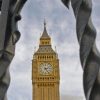Hong Kong police have received more than 2,500 tip-offs since the launch of a hotline for people to report suspected breaches of the city’s sweeping national security law.
The multi-platform hotline, which opened on Thursday, allows Hong Kongers to report information directly to national security police via text message, email, or WeChat.
A police spokesman told the Guardian that by Friday morning the force had received more than 2,500 pieces of information. The hotline can accept audio, videos, photographs and texts, and contributors will remain anonymous and receive no replies once they have submitted their tips, police said.
While many countries have law enforcement tip lines, Hong Kong’s has been denounced by critics as reminiscent of China’s Cultural Revolution, when neighbours were encouraged to monitor and inform on each other.
The broadly defined national security law, imposed on Hong Kong by Beijing in June, criminalises a wide range of acts on the grounds of subversion, secession, foreign collusion or terrorism.
Speaking from Beijing, Hong Kong’s chief executive, Carrie Lam, hailed the law as having been effective. “You don’t see major violent incidents any more. So in this sense, the law has been very effective in having a deterrent effect,” she said.
At least 27 people have been arrested under the law, several of them twice, although only two have been charged. While authorities said it would only be used against a “small group” of criminals, it has resulted in the criminalisation of benign acts that support independence, and a chilling effect across media, academia and in schools.
Amid the crackdown others have also been arrested using pre-existing laws, including seven pro-democracy legislators held on Sunday over alleged contempt offences and a pro-democracy activist accused of colonial-era secession crimes.
Speaking outside of a court appearance on Friday, the legislators accused the government of seeking to suppress dissent inside parliament.
On Tuesday, Choy Yuk-ling, a producer for a current affairs TV show, was arrested and charged over misusing a vehicle registration search function while investigating the involvement of gang members and police in the Yuen Long attack in July 2019.
The resulting documentary, which aired last year, revealed police were present but took no action, her employer RTHK said.
Lam declined to comment on the case but repeated that Hong Kong’s press freedom was protected as long as journalists did not break the law. A key criticism of the law has been that its dearth of specifics makes it difficult for journalists to know if they are breaking the law.























































Свежие комментарии